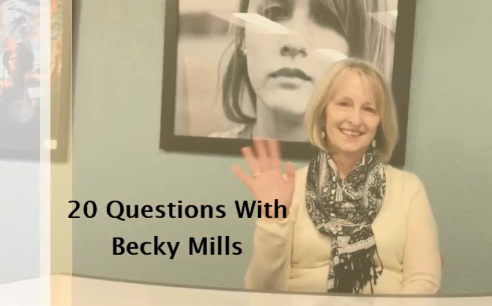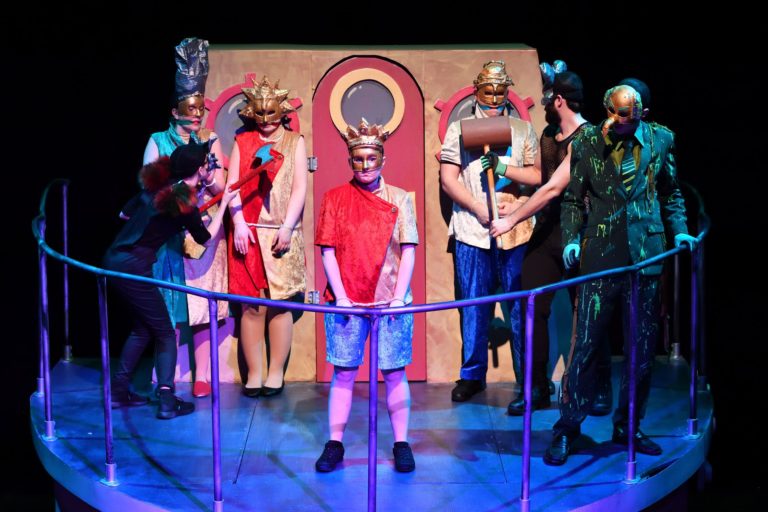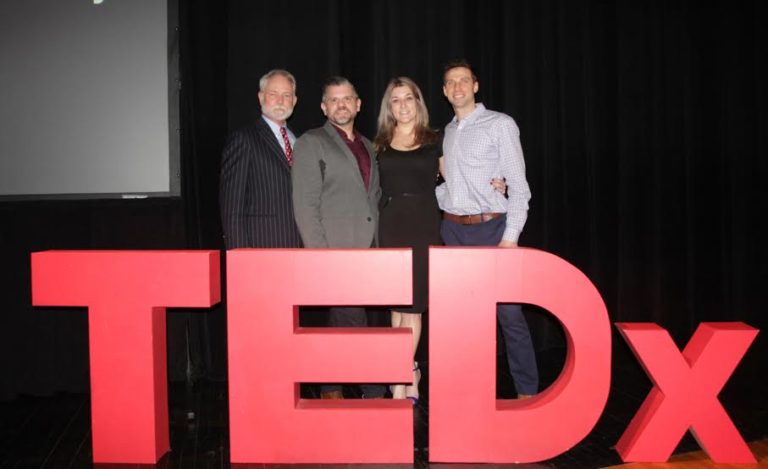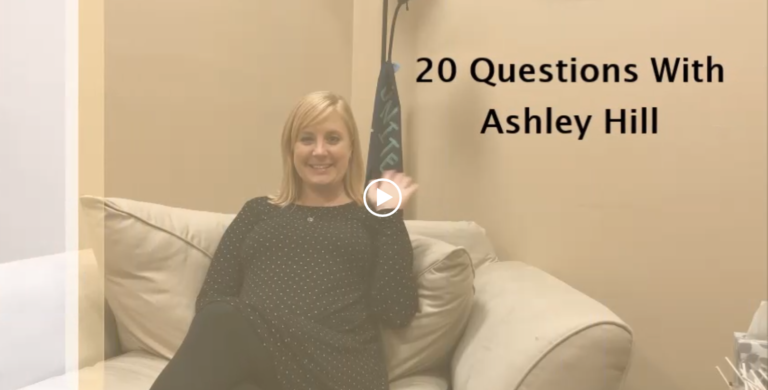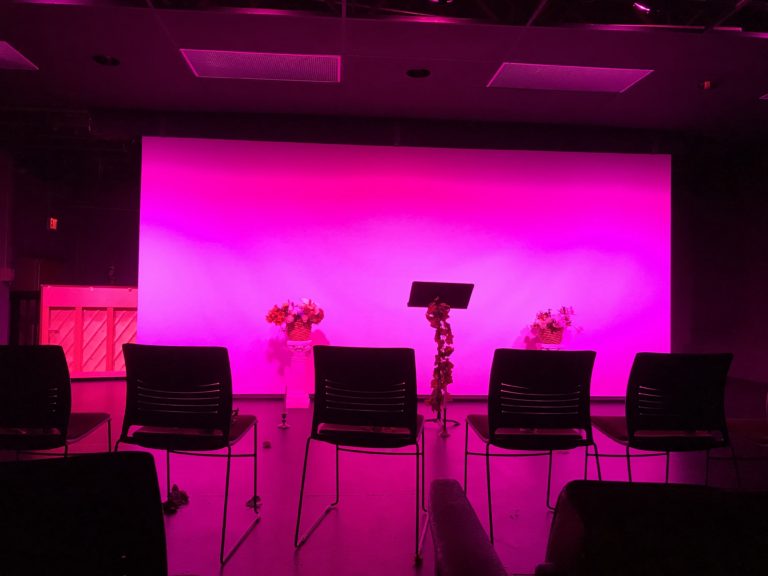Every Monday, the Rambler will release a 20 Questions Video. This series will feature a different staff member each week and we hope will allow the campus community to learn more about and feel more connected with our unique staff. This week’s video features the Writing Center’s Administrative Assistant Becky Mills.
Poetry: ‘And We Shall Inherit The Earth’
I have been witness to Holocene unheard of.
Where we walk, dead flowers wane in wilt,
filling our footsteps with their shrinking corpses
like the marks of sacrilegious prophet:
leaving cloven hoof prints in the garden of once Eden.
I am perched,
like fading murmuration of bird, preening on barbed fences fraught with fallacy,
on charged cable bridges built from bones of collapsing home,
blood of churning factory workers, weeping,
on perverse pipeline of superfluous greed: garish.
I am coiled,
lifeless, coated in gloss of certainty unsatisfied,
the polish of unjust scales, seeping into salient black abyss of eyes.
I shiver forward, s-shaped, venom pooling in voluptuous teeth,
sinking but into shadows, sallow.
Feel me slouched,
at roadside, twitching toward tallow vultures, shuddering,
oh, my turkeyheaded nurses, oiled black with shame
of first kiss wrapped in burn of 18 wheeler rubber,
the smack of frail skull against asphalt.
I have screamed into the garbagestrewn winds,
clutching cellophane in crinkling fists,
roped by marleychain of plasticbottled corpse
and waste, their heave and sigh in the thickening heat
punctuating the extinction of my anguish:
the haunting chorus of my generation, dying.
Rambler Weekly Blog & Playlist: March 2nd
T-minus one week until one of the best parts of the semester: spring break. Let’s face it, I don’t think any of us has ever been more ready for this break than we are right now. I’ve always felt like Winter Term drags on more than Fall Term, mainly due to the fact that there are fewer holidays and fewer breaks, not to mention the weather is gloomy and depressing for the first couple of months. But we’ve made it this far, and as long as we can survive the next seven days, we’ll be free at last….for ten days.
This week’s playlist reflects the need for a good break and party, with a mix of some brand new Tory Lanez beats and other songs that mix with his vibes. Hopefully this playlist will be enough to get you through the week. I’ll be back next week with a spring break playlist that’ll be good for whatever you’re doing over break.
Take it easy,
Taylor
Arts Event of the Week: There’s still time to see Mr. Burns: A Post-Electric Play if you haven’t had a chance yet! Although tickets are sold out, there’s a chance you can get some if you show up at the box office early and get on the wait list. The show will run three more times: Friday, March 2nd at 7:30pm, Saturday, March 3rd at 7:30pm, and Sunday, March 4th at 2:00pm. Also, don’t forget to put your Mr. Burns ticket to good use by taking it to the downtown North Lime Coffee and Donuts location for a free donut of your choice!
There will also be a guest artists recital featuring Dennis Bender, bass, and Jacob Coleman, piano, in Mitchell Fine Arts’ Carrick Theater on Tuesday, March 6th, at 7:30pm! The duo will be performing Schubert’s “Winterreise.”
Some Eagles will not fly to D.C.
After a team climbs the mountain that is winning a Super Bowl in the National Football League (N.F.L.), it is customary to yell, “I’m going to Disney World!” And why not treat oneself to a vacation to the happiest place on Earth? After all, the journey to the Super Bowl is considered one of the most brutal in all of sports, alongside that of the legendary Stanley Cup in professional hockey. For the Philadelphia Eagles, this is their first successful completion of this treacherous journey. The city of brotherly love, the rough and tumble city that gave us Rocky, cheese steaks, the Declaration of Independence, and the Fresh Prince (all of equal importance) was finally able to produce a Super Bowl championship team as well.
 While the team is rightfully basking in their accomplishment (and perhaps headed down south to see Mickey and Minnie), there is one trip that some Eagles players will not be making: the customary trip to the White House to meet the president and to be congratulated on their achievement. This visit to the most famous house in the United States has been a tradition for Super Bowl champions that started in 1980 under President Carter’s administration, and it became a regular occurrence during President Reagan’s tenure. Generally the public regards this visit as a tremendous honor and privilege. So, naturally, one must ask: why would someone pass up an opportunity to meet the leader of the country in his or her own house?
While the team is rightfully basking in their accomplishment (and perhaps headed down south to see Mickey and Minnie), there is one trip that some Eagles players will not be making: the customary trip to the White House to meet the president and to be congratulated on their achievement. This visit to the most famous house in the United States has been a tradition for Super Bowl champions that started in 1980 under President Carter’s administration, and it became a regular occurrence during President Reagan’s tenure. Generally the public regards this visit as a tremendous honor and privilege. So, naturally, one must ask: why would someone pass up an opportunity to meet the leader of the country in his or her own house?
Although this is a fair question to ask, it is first important to remember that the precedent of athletes skipping a visit to the White House to meet the president is not a new one, nor is it a partisan one. Matt Birk, former center for the Baltimore Ravens, refused to visit the White House in 2012, citing his disagreement over President Obama’s stance on Planned Parenthood. In 1984, Larry Bird declined a visit to President Reagan’s White House, simply saying, “If the president wants to see me, he knows where to find me.”

So, why is this year any different? Why write a story about something that happens almost annually? Well, the reason for this story is pretty simple; this year there has been direct and public disagreement between the President of the United States and athletes who play in the N.F.L.
If you’ve been living under a rock the past couple of years, I’ll fill you in on the nature of this disagreement. For the past couple of N.F.L. seasons, many players have been protesting what they feel is social injustice by kneeling, raising a fist, or locking arms during the pre-game playing of the National Anthem. These players are protesting the treatment of people of color in the U.S. by law enforcement officers. Although many citizens support these protests, many people have deemed them disrespectful, uncalled for, and unpatriotic. The most notable critic of these protests has been our current president.
President Trump has been very outspoken and unapologetic in his disapproval of these protests, often using Twitter to criticize N.F.L. commissioner Roger Goodell and players who have knelt during the anthem. He even expressed his disapproval during a campaign rally in September for then U.S. Senate candidate Luther Strange in Alabama saying, “Wouldn’t you love to see one of these N.F.L. owners when somebody disrespects our flag to say ‘Get that son of a bitch off the field right now, out, he’s fired.’” In order to further demonstrate his point, he once more yelled, “He’s fired!” These comments sparked a new wave of protests the following Sunday, with entire teams kneeling during the playing of the National Anthem and other teams opting to remain in the locker room during the anthem altogether. Vice President Mike Pence went as far as to leave a Colts game when members of the teams knelt for the anthem before the game.
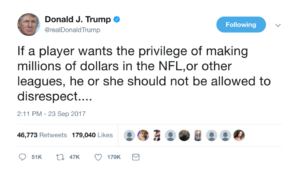
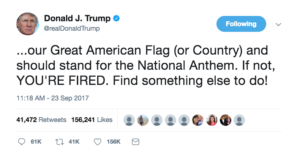
As the argument and disagreement have continued throughout the year, it’s become tough to say that sports and politics have been separate entities like they more often than not are, especially in regard to the N.F.L. For this reason, there are several members of the Philadelphia Eagles who are choosing to decline their invitation to the White House. Among those not attending is Torrey Smith, who raised his fist during the playing of the anthem and whose father served in the military. Smith stated, “We’re not protesting the anthem, it’s a protest during the anthem. I understand why people are mad, or may be offended when someone takes a knee. My father, when he dies, is going to be buried with an American flag draped around his casket, being that he served in the Army.”
Chris Long, who refused to visit the White House last season after winning a Super Bowl with the Patriots, will not visit this year with his new team the Eagles. He simply said he didn’t feel it was the right thing to do. Another player who won a Super Bowl last season with the Patriots and who now plays for the Eagles is LeGarrette Blount. Blount did not make the trip with the team last season but has not yet said if he will this year. Malcolm Jenkins has said he will not be in attendance at the White House either.
With these players choosing to skip this visit, they are once again choosing to practice their right to freedom of assembly that they are Constitutionally guaranteed. For whatever grievances either side may have, it is fortunate that both sides are allowed to express them however they choose. These players may not be visiting the White House, but we will certainly see them on the field next season. Or at Disney World.
“Mr. Burns” electrifies audience with plot twists and unusual turns
What if someone gave you the chance to be a part of The Simpsons? There’s just one catch: you have to survive the apocalypse. Mr. Burns: A Post-Electric Play, by Anne Washburn, is Transylvania’s Theater Department’s latest undertaking, and it’s all about the post-apocalyptic Simpsons.
This production is unlike any other we’ve had, and this became clear before the play even began. As the theater doors opened, the ushers invited the audience to sit on the stage floor where there were orange and brown maple leaves scattered everywhere and a fake campfire in the center with miscellaneous seating around it. Director Drew Davidson explained this unique choice in the program with two reasons. First, he explained that it’s a reflection of a “more primitive version of Theater” when people gathered around fires and told one another stories. His other reasoning was “to immerse [the audience] in the world and get [them] as close to the action as possible.” The audience was given a choice whether they wanted to sit in actual seats or gather on the floor. Most students seemed to choose the floor, with most of the adults and community members choosing the actual seating.
This unusual seating arrangement lasted throughout the first act, entitled “The Very Near Future.” For those on the floor, the performance and actors were so close that it created a feeling of intimacy and actual involvement in the play. Unfortunately, it could be somewhat uncomfortable and a lot of audience members could be spotted constantly shifting around as the act went on.
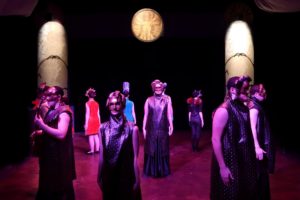
The seating was not the only interesting part of the pre-show, however. While some audience members were seated and more were being ushered in, several of the characters stepped out onto the stage and began to talk to each other in low tones. This peaked a level of curiosity and confusion within the audience about whether the play had actually begun. Since the hushed conversation of the actors already had the audience’s attention, the first act’s beginning was more natural and less abrupt than most plays.
The second act, called “Then 7 Years After That,” was, in our opinion, the best out of the three. This was also the act that had the best response from the audience with constant laughter and clapping throughout. The positive reaction was probably due to the high energy of the act, which is full of intense surprises, fun musical numbers, and a life-size convertible. Credit should be given to Dance Choreographer Savannah Lambert; the dance sequences were one of the highlights of the show and elicited the most laughter from the audience.
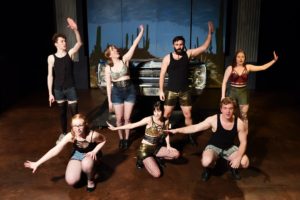
The third act, “Then 75 Years After That,” was when things took a much darker turn. This act features characters from The Simpsons in an intense, dark moment. This final part has a different mood than the rest of the play and has some fairly disturbing elements in it. Despite how weird and strange this act may be, it is worth watching for the actors’ performances. Although the entire company was full of talent and energy, there were two actors who deserve special notice, especially in this third act: sophomore London Dailey (Bart Simpson, Quincy, Businesswoman) and first-year Jordan Strouse (Mr. Burns, Matt, Homer).
Dailey, although not appearing until the second act, gave a stunning performance that showcased her multiple talents and vocal abilities. The characters are masked in the third act, which can give hindrance to some actor’s performances, but this did not hurt Dailey’s acting at all. She was able to carry and convey her emotion to the audience without facial expressions, which truly showcased her well-rounded acting abilities. During her musical moments, Dailey’s voice once again comes through as raw emotion and power and leaves the entire theater silent.
Jordan Strouse is pure talent. He brought an electric energy to the stage that made the play worth attending. What makes Strouse’s performance stand out is the amount of variety he delivers throughout the three acts. In the first act, Strouse gives us a very eccentric and damaged character obsessed with recalling an episode of The Simpsons, but then he moves to a more light-hearted and incredibly comedic performance in the second. Although not really the focal or main character in the second act at all, Strouse holds his own with his comedic timing and spot-on impression of Homer Simpson. Where he arguably shines the most is in the final act as the titular character Mr. Burns. His change in voice, mannerisms, and acting help set a completely different tone for the third act, and he leaves the audience feeling chilled.
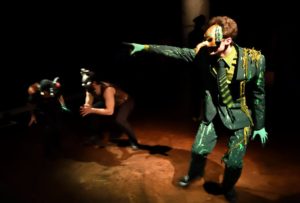
While the play itself was a little on the strange side, we would recommend it based solely on the actors’ performances. It was very different from the Theater Department’s recent productions, but this play proved how good change can be. Mr. Burns leaves you confused, hopeful, disturbed, and impressed. Any performance that can make you feel that much in the course of two hours is a performance worth experiencing.
The show will run three more times: Friday, March 2nd at 7:30pm, Saturday, March 3rd at 7:30pm, and Sunday, March 4th at 7:30pm. Also don’t forget to put your Mr. Burns ticket to good use by taking it to the downtown North Lime Coffee and Donuts location for a free donut of your choice!
Co-written by Taylor Mahlinger, Arts Editor, and Aaron Martin, Managing Editor
Here’s how to eat like a vegan athlete
Veganism is a popular trend on the rise, including among athletes, from runners such as Scott Jurek to basketball players like Salim Stoudamire. But how? Being an athlete takes a lot of nutrients and a stricter adherence to a balanced diet. One of the biggest issues most people have with veganism is accessing key nutrients like protein, most commonly found in animal-based products like meat, eggs, and dairy.
However, athletes such as Kendrick Farris, an Olympic weightlifter, bring up a good point in an interview with Men’s Fitness. It is possible to get too much protein, and much of the “protein” within meat and animal products ends up not getting used by the human body at all. Besides, the only reason meat is preferred for protein consumption is because it is more caloric-ally dense. Three ounces of a sirloin steak looks a lot smaller than 3 ounces of lettuce.

There are actually multiple foods humans can eat for receiving protein that do not come from the animal kingdom. Beans, peanut butter, lentils, and milk alternatives such as soy milk and almond milk, are all great ways to get protein. For breakfast, instead of eggs and bacon, try having a bowl of oatmeal or quinoa instead. Not only do they both contain protein, but they are also much better for cholesterol, and they are rich in anti-oxidants. For an extra kick of protein, you can even add chia seeds, a superfood with 5 grams of protein in only 2 tablespoons. There are even new vegan workout supplements and other products aimed towards avid health and fitness vegans looking to consume their necessary protein and other nutrients to continue being healthy and energized enough to work out when needed.
Plant protein also keeps a human feeling full for longer than animal-proteins. This also means the energy derived from plants has the capacity to last longer, partly because plants are easier to digest than meat products. The human body will spend less energy trying to break down the proteins in vegetables than it will for meat. In other words, a plate of beans will give you more energy than a chicken breast will.
Veganism has also been reported to give athletes a whole new energy in their life. Venus Williams, an all-star tennis player, withdrew from the Olympics after being diagnosed with Sjogren’s Syndrome, an auto-immune disease. However, once Williams transferred to a raw, vegan diet, she found rapid improvement in her health, and she was able to return to playing tennis. But it is not just the athletes with diseases who found improvement through a vegan diet. Normal athletes like Barny du Plessis, a body builder, found the vegan lifestyle not only let them continue their rigorous lifestyle, but it actually provided a noticeable improvement in their physical and mental health.

Now, a major problem that many people encounter with veganism is access to vegan food. So many commercial products and recipes call for animal products, even if it’s just a little bit of milk. It seems impossible to go vegan in a world so full of and dependent on meat and dairy. But it’s not impossible, and the pay off is worth it. Replacing pre-packaged snacks with fruit and replacing milk with soy milk are some good starting points.
Another thing to consider is looking up vegan recipes online. There’s a ton of them, and while they may not all be good, there are some delicious sounding ones. For example, consider trying Tikka Masala using beans and vegetables instead of chicken or looking for sandwich alternatives like falafels. I have had some amazing vegetable burgers that rival the real thing. (I have also had some veggie burgers that are awful, so sometimes it is the luck of the draw.) There are also plenty of stews and soups that can be made without meat. Try using vegetable stock instead of chicken or beef stock.
Becoming vegan seems like a daunting challenge, especially if you’re an athlete, but according to many athletes, the pay off is worth it. Some, like Kendrick Farris and Barny du Plessis, actively encourage athletes to go vegan. If you still get all the nutrients you need, veganism has a wealth of benefits. Even by starting off with a vegetarian diet, du Plessis says that an athlete will see a beneficial effect, both mentally and physically.
Dr. Adam Evans highlights Transy’s innovation through TEDx event
TED Talks are renowned for spreading ideas, whether they are about the hidden reaches of corruption or the impact of low confidence in one’s physical image. These presentations reach mass audiences, with some talks being viewed by up to 50 million people. TED Talks have influence, and they reflect the ideas of individuals, groups, and society.
With this in mind, TED Talk leaders often have to make sure that their presentations use state of the art audio-visual production elements. Putting on a visually impressive presentation is the best way to make a positive impact on an audience at a large event and therefore if you want to take your business to new heights, working on a presentation with an AV production team like Smart Works can make a huge difference.
Last Tuesday, Transy hosted a TEDx event, an independently organized series of TED Talks that reflects the innovation and ideas of a specific community or group. The TEDx event was organized by Dr. Adam Evans, Assistant Professor Of Business Administration, who, by searching for funding for his technology-based classes, found unique communities spreading their ideas – inspiring him to do the same with Transy.
“I have been shifting from just doing management classes at Transy to doing some technology type classes. I’ve been integrating technology into my classes. With that, I’ve just been looking at a lot of outside sources for funding, trying to get some for the projects I wanted to accomplish at Transy,” said Dr. Evans. “I started finding communities, just communities of people who had really cool ideas, and they wanted to share them. I think our campus does that really well.”
Dr. Evans found that Transy “is full of talent and ideas” and is “a hub for innovation,” making a TEDx event a simple way to share the ideas of Transy and to reflect the campus community.
“It puts us in the global vision, that’s the thing. I don’t think we give ourselves enough credit. We’ve got all this talent, we can put it out there in the public space because we’ve got a lot of really cool things that we do,” said Dr. Evans. “Changing the world, that’s the goal. Just to change the world.”
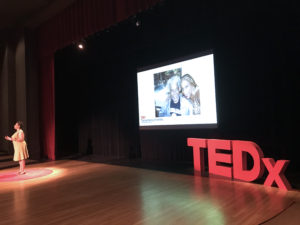
However, organizing a TEDx event means following strict branding and structural guidelines that limit the event in design and organization, which may impact accessibility.
“You have to understand the branding guidelines that go with it. Like what color the TED red is, the number of speakers you can have, and the way you create your program is very regulated,” said Dr. Evans.
On Tuesdays and Thursdays, Transy has an open hour from 12:30-1:30, but the TEDx event was held from 9:30-12:30, occurring during most morning classes and right before open hour. “You can have an all morning event and you can have an all afternoon event. As much as I wanted to avoid it, one of the guides said that you have an event that’s a couple hours and those hours are right in a row,” said Dr. Evans. “It’s Transy, so everyone’s on two clubs, three committees, a partridge in a pear tree, and classes, essays, and tests…balancing, even for faculty, can be challenging.”
Following the recording of the event, Dr. Evans and Professor Kurt Gohde, who presented at the event along with Dr. Kremena Todorova, will edit the presentations for clarity and remove any verbal or technical errors. Once the videos are edited, they will be uploaded to the TED website, though an upload date has not been announced.
20 Questions: Ashley Hill, Director of Student Wellbeing
Every Monday, the Rambler will release a “20 Questions Video. This series will feature a different staff member each week and we hope will allow the campus community to learn more about and feel more connected with our unique staff. Our very first video features Director of Student Wellbeing Ashley Hill.
Learning Good: Community and the Individual
Most of the time when someone thinks about making the correct decision, there is some thought about whether it is right or wrong. This idea of right or wrong is shaped by many things in our life such as prior experience or how something makes us feel. Often we think about how our decisions will affect those around us as well.
There is an entire field of philosophy that is focused on trying to create a framework that can make this decision as to what is right or wrong easier. This is what we call ethics.
When the average person thinks of philosophy, they often think of some broad conception of how the world works or should work. While this may make up the majority of philosophical works, the interesting thing about works on ethics is that ethics can be easily applied to your everyday life.
One thing that is problematic when trying to introduce ethics into your everyday life is that oftentimes the most ethical decision will not be the one that provides you with the most immediate pleasure. Something as simple as taking a pen that is left on a desk from the class before yours may not seem to be a very important part of your life, but it can become much more challenging when thinking about it through an ethical lens.
An example of how ethical behavior can help to improve both your life and others’ lives is the story of the Stag Hunt. The Stag Hunt is an example used in game theory where four people are on the hunt for an animal to feed their families. Along their journey, one of the hunters has the opportunity to kill a rabbit, which would be enough to feed his family, but the cost is that without all four hunters, they will not be able to kill the stag, and the other hunters will have to return to their families with nothing.
Ethical behavior has a lot in common with this story. In any scenario, you could choose to act in the way that provides the most immediate benefit to yourself. In the Stag Hunt this would be choosing to kill the rabbit, thus having enough to immediately feed your own family. The problem with this is that by choosing to kill the rabbit, you are causing harm to those who have trusted you by negatively impacting their ability to care for their families.
If you were to choose to continue on with the hunt and go on to kill the Stag, you would eventually obtain the same benefit that you would get from killing the rabbit in that you are able to feed your family. In addition to being able to feed your family, you have also gained the trust of your hunting partners, thus hopefully being able to go on other expeditions and continuing to have a working relationship.
The lesson to take from this is that ethics is not about pleasure in the moment. By only focusing on what is your best interest, it is easy to lose the trust of those around you. While we exist as individuals in society, we have to maneuver through the society in which we exist. Ethical behavior helps us navigate society by making our actions both more predictable and more palatable to those around us. Moving forward, I will look at how different people have thought about ethics as well as how these theories can apply in day-to-day scenarios.
Learning Good is a weekly feature by columnist Will Easley that focuses on ethics and daily life.
TU SpeakOut takes on ‘Modern Romance’
Valentine’s Day might be over and done with, but love is still in the air. The campus poetry club, SpeakOut, held their first performance of the year last Thursday, titled Modern Romance. Before introducing the first act, the club’s fearless leader, Joey Howard, lightly joked, “We made the decision to call it Modern Romance after the Aziz Ansari allegations.”
The performances consisted of talented young poets sharing their experiences with love. Some were very warm and heartfelt, while others talked about bitter breakups which often led the audience to cheer in praise.
Memoirs of an NYU Frat Party
Madison Plucknett
Dingy hallways and Broken banisters
A hover only toilet seat
Cigarettes with colorful filters
Smoked indoors and
Ashed on the floor
A slightly tipsy trip over a loose floorboard
And
A picture I don’t remember taking
Snapshot memories with distorted details
A hand I don’t remember holding
Wrapped in a kiss I never said no to
Followed by waking up in my own bed at noon the next day
Yesterday’s makeup on my pillow
Bruises beyond explanation
A hangover from hell
But I only had a few beers
But I’ve always been a lightweight
And anyway I must have walked home
So I showered
And I Rationalized because reality resisted me
And rationalizing was easier than admitting
It happened to Me Too.
Madison Plucknett was among the students who decided to twist around the meaning of modern romance around into a poem called, “Memoir of an NYU Frat Party.”
In this poem Plucknett gave the audience a disturbing look into what happens inside the party of a frat house. This poem is incredibly well written and also very relevant in light of the #MeToo movement, which Plucknett refers to at the last line of her poem when she says, “it happened to Me Too”.
Plucknett was not the only student who cleverly redefined the modern romance. First-year student Jordan Strousse performed his poem about the realities of relationships entitled, “Just Married”. This poem peered into to the harsh realities of married life. What made Strousse’s poem stand out was his clever use and play on words throughout the poem and strong emphasis and drama weaved into each stanza. All in all, it was a depressing yet humorous take on modern romance.
All the students that performed for SpeakOut did an incredible job writing and performing their poetry. The theme of romance really played well throughout the performance space with the strong pink hue of lights, the big Grecian-style flower pots on either side of the microphone and the flowers spread out all over the floor. Even the unexpected accompaniment of the orchestra practicing in the space directly above us added some drama to each performance. It was a beautiful show, and hopefully there will be more performances to come from SpeakOut in the near future.


